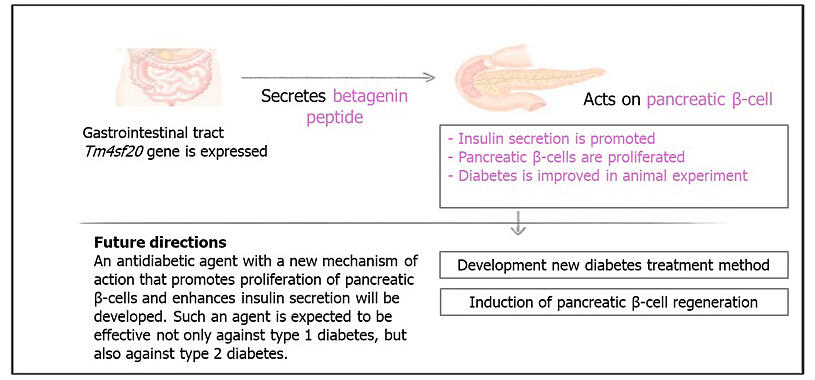A new candidate molecule for the treatment of diabetes mellitus has been discovered by a joint research group led by Visiting Associate Professor Hideo Toyoshima and Associate Professor Tomotaka Yokoo of the Biomedical Research Center at Saitama Medical University, Professor Hitoshi Shimano of the Faculty of Medicine at the University of Tsukuba, Director Yasushi Okazaki of the Intractable Disease Research Center, Graduate School of Medicine at Juntendo University, and Professor Seiji Takashima of the Graduate School of Frontier Biosciences at Osaka University. Betagenin, a peptide derived from the gastrointestinal tract, has the dual effects of promoting insulin secretion and the proliferation of pancreatic β-cells. In a mouse model, betagenin induced regeneration of pancreatic β-cells, which were decreased due to diabetes mellitus. The findings may contribute to the development of a revolutionary therapeutic approach to diabetes mellitus. The results were published in the Journal of Biological Chemistry.

Provided by Saitama Medical University
Diabetes mellitus is caused by an insufficiency of insulin action (a hormone that is secreted by pancreatic β-cells and lowers blood glucose). In type 1 diabetes, pancreatic β-cells are attacked by the body due to autoimmune mechanisms, whereas in type 2 diabetes, β-cells action is reduced, leading to insufficient insulin secretion and elevated blood glucose levels. As diabetes progresses, the insulin secretion capacity of pancreatic β-cells declines, which is considered to worsen the pathological condition. Currently, therapeutic agents that enhance insulin secretion from pancreatic β-cells are used. However, no treatment strategies have been established to increase insulin production by expanding the number of pancreatic β-cells.
In recent years, incretin-related drugs have been used with great success as therapeutic agents for diabetes mellitus. However, their effects on maintaining insulin secretion capacity and protecting pancreatic β-cells remain inconclusive. The research group investigated intestine-secreted humoral factors linked to lifestyle-related diseases and identified an extracellular peptide fragment, betagenin, derived from the Tm4sf20 gene, which is specifically expressed in the gastrointestinal tract. They found that betagenin increased pancreatic β-cell mass and insulin secretion, improving the pathological condition in a mouse model of diabetes mellitus.
Based on experiments in cultured cells, they found that betagenin increased insulin secretion and pancreatic β-cells. In diabetes model mice, forced expression of betagenin improved the diabetic condition and increased pancreatic β-cell mass. Additionally, in transgenic mice with betagenin overexpression and knockout mice, pancreatic β-cell mass was more than three times and less than four times that of control mice, respectively.
The artificially synthesized betagenin peptide, designed based on the amino acid sequence of purified extracellular betagenin, enhanced insulin secretion in human and mouse islets and promoted pancreatic β-cell proliferation. Furthermore, administration of this synthetic peptide to diabetes model mice restored pancreatic β-cell mass, reducing the blood glucose level and ameliorating diabetes.
These results suggest that targeting betagenin and its regulatory molecules in drug discovery could lead to innovative therapeutic strategies for simultaneously improving blood glucose levels and promoting pancreatic β-cell regeneration in patients with diabetes.
Journal Information
Publication: Journal of Biological Chemistry
Title: Betagenin ameliorates diabetes by inducing insulin secretion and β-cell proliferation
DOI: 10.1016/j.jbc.2025.108202
This article has been translated by JST with permission from The Science News Ltd. (https://sci-news.co.jp/). Unauthorized reproduction of the article and photographs is prohibited.




